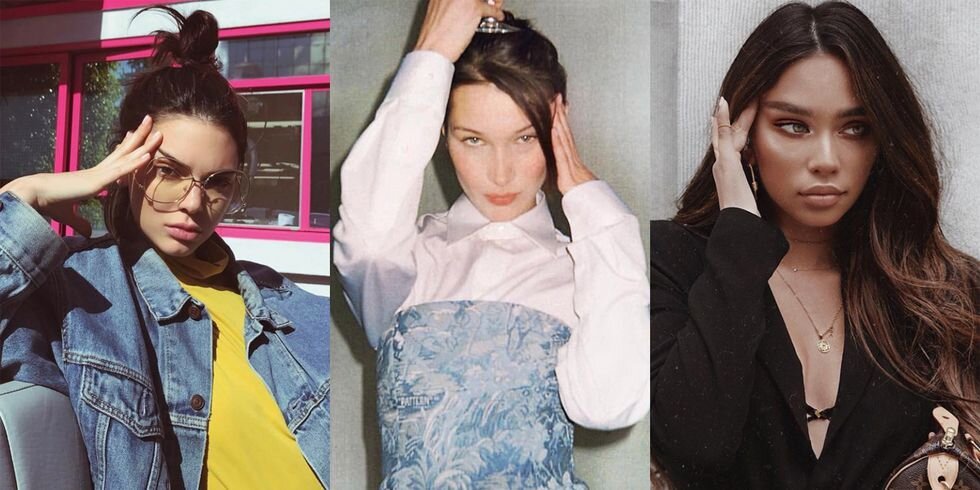Is the Fox-Eye Challenge Racist?
“I remember when I was in primary [school] people were making fun of Asian eyes doing this, now it’s a trend."
The latest social media makeup trend, the fox-eye, is everywhere. Inspired by model Bella Hadid and actress Megan Fox, the look involves lining your inner corners, winging out the ends, slightly smudging your eyeliner and eyeshadow, shaving off part of your eyebrow, and then redrawing it. The fox-eye creates an upturned, slanted illusion by elongating and lifting the eye for an angular finish.
The look is now coupled with a photo pose called “the migraine pose,” where people pull their eyes back at the edges—you’ve probably seen it on a celebrity’s Instagram feed, or a TikTok video, where the #foxeye hashtag has garnered over 61 million views. Yet, despite the booming popularity of this “challenge,” many have called out the trend as cultural appropriation of Asian features. The look mimics the narrow and upturned eye shape that Asians are often harassed for. Although the now highly desirable fox-eyes may seem “flattering” and complimentary towards Asians, it dismisses the hate and prejudice we have endured for the very same feature. Many have encountered belittling Asian-eye jokes, and historically in racist caricatures, Asians have always been portrayed with exaggerated slits as eyes. The trend turned one of our largest insecurities and trauma on its head. Something that Asians have been bullied for is now the new standard of beauty.
The ironic thing: the very gesture of pulling back their eyes to mock Asians by non-Asians, is now something that everyone wants to do as a desirable look. Narrow eyes that used to be deemed “slit-like” or “chinky” on Asians, are now “attractive” and “appealing” on non-Asians. This is, essentially, the very concept of cultural appropriation. The look is only attractive once white women such as Bella Hadid, Megan Fox, and Kendall Jenner adopt it, but not on Asian influencers.
However, many have posed the question: is the fox-eye trend really racist? Some Asians say they don’t find the look to be racist because the trend is not intended to imitate Asian features and that the big, elongated eyes do not resemble them. Some feel that the trend is positive, that it feels good that it is now “cool to be Asian,” and Asian culture is becoming more globally popular. However, intention is irrelevant when it comes to cultural appropriation once an attribute is adopted by a more dominant group, particularly if there is a complete disregard for the challenges that the original group faced because of that very attribute. Non-Asians who take selfies and make TikToks with their eyes pulled back are not thinking about the racial origin of the gesture, but that is the issue. They have the privilege of not being on the receiving end of racism.
Personally, I do not see similarities between the actual fox-eye makeup look—no mimicking of the monolid or hooded-eye shape. However, the problem is with the pose. The makeup trend may not resemble stereotypical Asian facial features, but posing with your temples pulled back is similar to a racist gesture and ignores the discrimination Asians have endured because of it.
The pose is an act of appropriation that dismisses the years of racism Asians have endured. A trend that makes people feel uncomfortable because of race shouldn't be a trend at all. Even if others may find it harmless because of their privilege of not undergoing the prejudice themselves, the feelings of Asians who are offended are not any less valid. The trend may not have the intent to deliberately emulate an Asian feature, yet it is an objective act of appropriation that ignores the discrimination that many Asian Americans have faced for aesthetic purposes. The same girls who'd pull back their eyes and bully Asians in school are now the ones embracing this trend. It's not theirs to have. It is now a "trend" because white women have jumped onto the bandwagon. If white people want to celebrate and "normalize" Asian culture, instead of trying to adopt an attribute as their own, they can support Asian creators and influencers.











